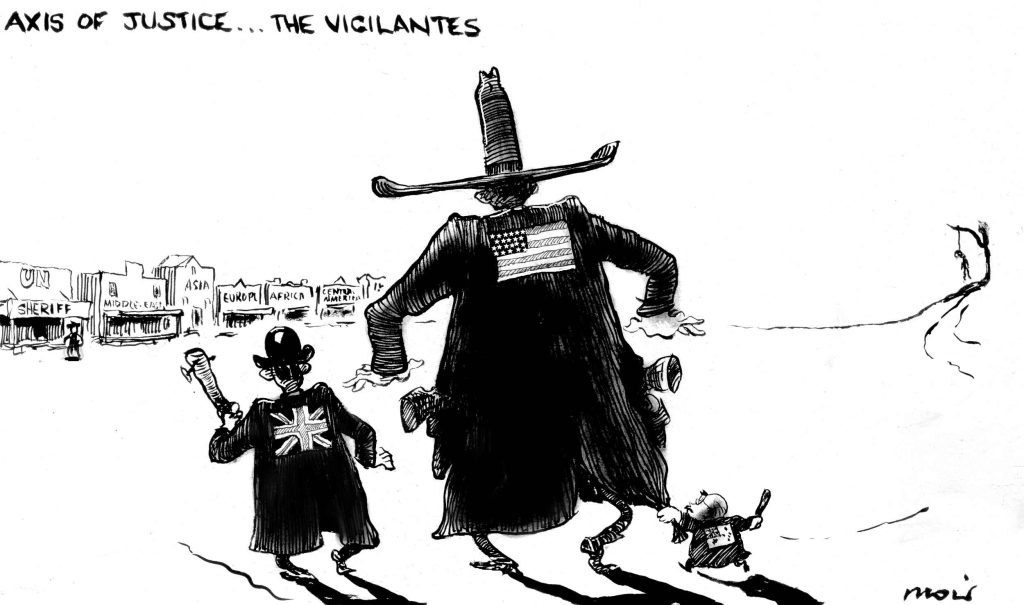
Image: Alan Moir 2013, with permission.
20 years ago, on 20 March 2003, the US, the UK, Australia and Poland invaded Iraq in an illegal act of aggression. As with all wars, we were told this one would be quick. The pretext for the invasion was – despite authoritative doubts raised at the time – claims about the Iraqi leader Saddam Hussein having weapons of mass destruction. There were no such weapons in Iraq, although plenty of them in two of the invading nations. After on-again off-again ADF deployments, the last Australian troops finally left the country in June 2020.
For the Iraqis, the war brought widespread violence, a breakdown of law and order, a virtual collapse of the health care system, a flood of forced displacements, human rights abuses by the occupying forces, a death toll at least in the hundreds of thousands, and an unknown but far higher number of people physically injured or psychologically traumatised.
The catastrophe that unfolded in Iraq was not the result of things suddenly going wrong. Virtually all of it was predicted beforehand by authoritative bodies. Millions of people on the streets globally, in unprecedented protests against the coming war, were right.
Twenty years on, the invading nations behave as if the war never happened. There has been no accountability for those that staged an illegal invasion, lied to the public, failed to protect Iraqi civilians, or committed crimes of war. Frequent ministerial references to the threat to the ‘global rules-based order’ rewrite history by implying that this threat is created only by others.
All its victims, along with Australia’s role in the invasion, have been erased from our official memory. The only mention of civilian casualties from the war on the Defence Department’s website is in relation to the battle for West Mosul in 2016-17, where the site refers to ‘potential involvement’ of the ADF in the deaths of between six and eighteen civilians. Associated Press estimated that 9,000 to 11,000 civilians died in that battle, an estimate nearly 10 times higher than that of official reports.
Nor has there been any official interest in reforming the dangerous process by which one person, the Prime Minister, takes our country to war, as PM Howard did in 2003. In 2012, when the Campaign for an Iraq War Inquiry was launched, both Labor and the Coalition quickly rejected the proposal. Even now, as a Labor-initiated parliamentary inquiry into our decision-making process for joining overseas wars continues, both Defence Minister Marles and Foreign Minister Wong have warned against any change. The submission from the Defence Department, which advised against any change, did not even mention the disastrous Vietnam and Iraq wars, and its only mention of the Afghanistan war was to commend how quickly we got out of it in 2021. Only by ignoring history can we pretend that the current process is robust.
But the need for change goes far beyond reforming how we decide to join wars of choice. We must prioritise peace, in action rather than just rhetoric. Instead, less than twenty years after the unmentionable Iraq invasion, three ‘coalition of the willing’ nations are already gearing up for war on a far grander scale, this time against China. AUKUS – Australia, the UK and the US – is the 2003 ‘coalition of the willing’ rebranded.
A virtual blank cheque has been written for new military hardware, nuclear submarines alone receiving funding and focus that health and other essential government services could only dream of. The government’s love of war-fighting technology was on fuIl display at the recent Avalon defence trade fair, where Minister Marles referred to air forces as ‘the coolest part of any military’, giving the Hollywood action drama Top Gun Maverick a boys-own special mention. The arms trade has become thoroughly normalised, just as it was in the lead up to World War 1, with the familiar lie about ‘deterring‘. Weapons industry brand names and funding are promoted in schools, universities, charities and even in our war commemoration.
However Marles also gave his final two sentences to diplomacy, stating ‘this will be our abiding focus, for it is through diplomacy that we can create pathways for peace.’ Labor has, commendably, increased funding for diplomacy, but such funding had been slashed over the past two decades and still pales by comparison to that of our war preparations. And it is critical that our diplomacy promotes genuine peace, which means addressing the security concerns of all nations, friend and foe alike, rather than simply strengthening military alliances.
In addition, the long-suffering people of Iraq deserve some accountability, not a terrible silence from the nations that invaded their country. Before the AUKUS coalition of the willing becomes any more willing to engage in yet more wars, we desperately need to look at the messes we’ve left behind elsewhere. Lest we forget Iraq.
This article was originally published in Pearls and Irritations.